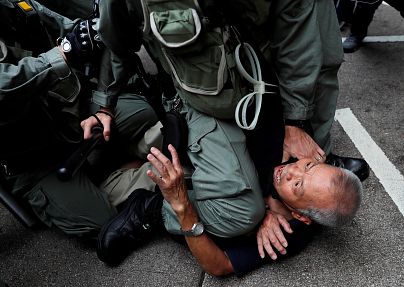"The Communist Party of China does not forget and does not forgive, so don't spoil their 70th anniversary," one expert said.
HONG KONG — It should be a triumphal 70th birthday bash. Instead, China faces the possibility that clashes in Hong Kong will overshadow the commemoration of the establishment of the People's Republic of China on Tuesday.
 ADVERTISEMENT
ADVERTISEMENT
 ADVERTISEMENT
ADVERTISEMENT
Police in Hong Kong said they anticipated "hardcore violence" in the semiautonomous territory as President Xi Jinping is expected to oversee a military celebration in Beijing.
"We are on the verge of extreme danger," police spokesman Tse Chun-chung said at a press conference in Hong Kong on Monday. "It is high time to halt all forms of violence."
Protests escalated through the weekend ahead of China's National Day, leading to police and civilian injuries. Police said demonstrators threw as many as 100 Molotov cocktails while officers responded with tear gas, water cannons, over 300 rounds of rubber bullets and 79 sponge grenades, forms of riot control that can cause injuries or death. Eleven people were arrested Saturday and another 146 people were arrested Sunday — almost half of whom were students.
The protests were first sparked in June over a now-withdrawn extradition bill but have since expanded to include calls for greater democratic freedoms amid fears that rights are being eroded by Beijing's growing control.
The demonstrations risk undermining both domestic and international perceptions of the authority and the power of China's ruling Communist Party, experts say.
Hong Kong's takeover in 1997 from Britain was presented as a symbol of the legitimacy of the Communist Party by uniting the country, Christopher Hughes, professor of international relations at the London School of Economics said. But as anti-Beijing sentiment rises in the territory, that legitimacy is being chipped away.
"The big message is that it's the Communist Party that saved China, the Communist Party that holds China together and that's why (they) have the monopoly on power," Hughes told NBC News. "That has painted them into a corner now that things have gone badly."
The tension calls into question the efficacy of the "one country, two systems" model of governance over the territory, he said. The model, in theory, allows Hong Kong to retain its own economic and administrative system, free from Beijing's interference, until 2047.
But a growing number of young people appear to be rejecting the model, Hughes said, especially with the uncertainty of what happens to the territory after 2047. "If you're a young person in Hong Kong, you want to know what your future holds for you."
But not all experts say the civil unrest is a sign of the system failing. Steve Tsang, director of the China Institute at the SOAS University in London, said the fact that protests are even allowed to occur is an example of how Hong Kong operates differently from other Chinese cities.
"Shanghai would never have tolerated three months of protests. It would simply never have happened," he said.
A political solution involving consultation and negotiation is the best way to resolve the situation, experts said, but Tsang doesn't think it's likely.
"Xi Jinping is like a hammer. If you are a hammer, everything is a nail," Tsang said. "He doesn't negotiate with people whom he sees as challenging his authority."
Hughes agreed, adding that the principals of Chinese nationalism are at odds with negotiation or consultation. "It's always seen as weakness if you actually talk to the people directly affected and try to reach a compromise or bring in some as arbitration."
Instead, Tsang said Xi will hand down "heavy repression" on Hong Kong by deploying the People's Armed Police that specializes in riot control or other security forces. But he added that a repeat of Tiananmen Square — the site of pro-democracy demonstrations in 1989 that ended in bloodshed and the movement being crushed — is unlikely.
The extent of force used by China will come down to how great an embarrassment Xi suffers, particularly in the international media, Tsang said. "The Communist Party of China does not forget and does not forgive, so don't spoil their 70th anniversary," he said. "Somebody is going to pay the price."











